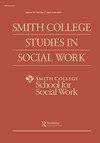肤色歧视与历史创伤:临床社会工作教育中治疗的障碍与垫脚石
IF 0.9
Q2 SOCIAL WORK
引用次数: 0
摘要
本文章由计算机程序翻译,如有差异,请以英文原文为准。
Colorism and Historical Trauma: Barriers and Stepping Stones for Healing within Clinical Social Work Education
ABSTRACT Colorism and historical trauma are part of the lived experiences of many racialized and marginalized groups. However, few studies have examined the meaning and function of colorism and historical trauma among clinical social workers and how prepared they feel to support healing from these experiences in their practice and lives. To address this gap, 42 clinicians of diverse racial, ethnic, gender, and regional identities from the United States were surveyed, of which 35 were interviewed, to explore their experiences of colorism, historical trauma, healing, and clinical social work education. Key themes will be presented: 1) Invisibilized healing & wounds: Black, Asian, mixed race, Latine, and people of color (POC) clinicians identified a need to heal personally from intrafamilial and societal experiences of historical trauma and colorist microaggressions, 2) Closing the gaps in clinical education, and 3) Clinical supervision as a compounded barrier or stepping stone. Implications for decolonial clinical social work education and practice will be discussed.
求助全文
通过发布文献求助,成功后即可免费获取论文全文。
去求助
来源期刊

SMITH COLLEGE STUDIES IN SOCIAL WORK
SOCIAL WORK-
CiteScore
1.50
自引率
10.00%
发文量
10
期刊介绍:
Smith College Studies in Social Work focuses on the vital issues facing practitioners today, featuring only those articles that advance theoretical understanding of psychological and social functioning, present clinically relevant research findings, and promote excellence in clinical practice. This refereed journal addresses issues of mental health, therapeutic process, trauma and recovery, psychopathology, racial and cultural diversity, culturally responsive clinical practice, intersubjectivity, the influence of postmodern theory on clinical practice, community based practice, and clinical services for specific populations of psychologically and socially vulnerable clients.
 求助内容:
求助内容: 应助结果提醒方式:
应助结果提醒方式:


